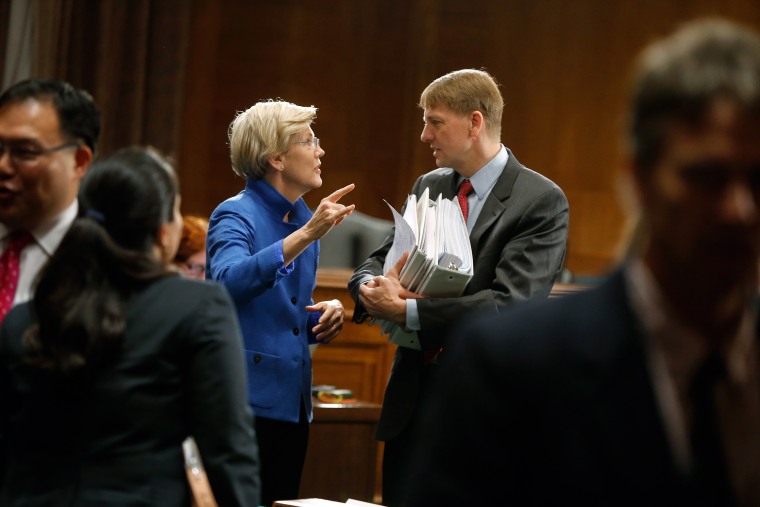For the last few years, the Consumer Financial Production Bureau has quietly done important work on behalf of everyday consumers, cracking down on unfair business practices from banks, credit-card companies, mortgage lenders, and other financial institutions.
And Republicans are still outraged by the agency's very existence. In the last debate for the Republican presidential candidates, not only did Carly Fiorina condemn the CFPB by name for its fraud-detection services -- I'm still not sure why that's a bad thing -- but during a commercial break, lobbyists for a student-loan company, which is currently under investigation, launched a "truly bizarre attack ad" targeting the consumer watchdog.
That was last week. This week, the editorial page of the Wall Street Journal went after the CFPB in a wildly unpersuasive piece on predatory auto loans. A day later, Politico published a big, front-page story with a provocative headline: "Emails reveal consumer protection agency’s cozy ties." The article told readers:
While Elizabeth Warren and other progressives decry the influence of big banks and lobbyists in writing legislation, in this instance, the agency created by Warren to protect consumers from abusive lending leaned heavily on consumer activists as it drafted regulations for the $46 billion payday loan industry. The Center for Responsible Lending spent hours consulting with senior Obama administration officials, giving input on how to implement the rule that would restrict the vast majority of short-term loans with interest rates often higher than 400 percent. The group regularly sent over policy papers, traded emails and met multiple times with top officials responsible for drafting the rule.
The far-right Washington Times, right on cue, picked up on the Politico report, publishing an article yesterday saying the CFPB was caught "conspiring" with outside groups.
From a distance, it looks as if some CFPB critics put a lot of effort into this public-relations offensive against the agency, but if they're waiting for the rest of us to be shocked and appalled, they're probably going to be disappointed.
What, exactly, did we learn from the Politico expose? That officials at a consumer-protection agency spoke with staffers at consumer-protection non-profit organizations about how best to -- you guessed it -- protect consumers, in this case against the excesses of payday lenders.
Why would that be a bad thing? I haven't the foggiest idea.
The Politico headline certainly gives the impression of nefarious activity -- "Emails reveal consumer protection agency’s cozy ties" -- though the emails really just show "cozy" discussions between a bunch of consumer advocates.
That's not controversial. It's the opposite. I'd be far more alarmed if the CFPB wasn't talking to consumer-protection officials at relevant non-profits.
I don't doubt the right's hostility for the agency, but conservatives will have to do far better than this.
